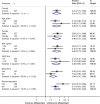Comparing the impact on the prognosis of acute myocardial infarction critical patients of using midazolam, propofol, and dexmedetomidine for sedation
- PMID: 34876027
- PMCID: PMC8650377
- DOI: 10.1186/s12872-021-02385-9
Comparing the impact on the prognosis of acute myocardial infarction critical patients of using midazolam, propofol, and dexmedetomidine for sedation
Abstract
Background: There are less studies focusing on the sedative therapy of acute myocardial infarction (AMI) critical patients. This study aim to compare the impact on the prognosis of AMI critical patients of using midazolam, propofol and dexmedetomidine.
Methods: We collected clinical data from the Medical Information Mart for Intensive Care III (MIMIC III) database. Data on 427 AMI patients with sedatives using were recruited from in Coronary Heart Disease Intensive Care unit (CCU).
Results: There were 143 patients in midazolam using, 272 in propofol using and 28 in dexmedetomidine using. The rate of 28-days mortality was 23.9% in overall patients. Through logistic regression analysis, only midazolam using was significant association with increased 28-days mortality when compared with propofol or dexmedetomidine using. In the subgroup analysis of age, gender, body mass index (BMI), white blood cell (WBC), beta-block, and revascularization, the association between midazolam using and increased 28-days mortality remained significantly. Through propensity score matching, 140 patients using midazolam and 192 using non-midazolam were successfully matched, the midazolam using presented with higher rate of CCU mortality, hospital mortality and 28-days mortality, longer of mechanical ventilation time and CCU duration. E-value analysis suggested robustness to unmeasured confounding.
Conclusion: Propofol or dexmedetomidine are preferred to be used in AMI critical patients for sedative therapy.
Keywords: Acute myocardial infarction; Mortality; Sedative therapy.
© 2021. The Author(s).
Conflict of interest statement
The authors declare that they have no competing interests.
Figures



References
-
- Ter Horst EN, Krijnen P, Flecknell P, Meyer KW, Kramer K, van der Laan AM, Piek JJ, Niessen H. Sufentanil-medetomidine anaesthesia compared with fentanyl/fluanisone-midazolam is associated with fewer ventricular arrhythmias and death during experimental myocardial infarction in rats and limits infarct size following reperfusion. Lab Anim. 2018;52(3):271–279. doi: 10.1177/0023677217724485. - DOI - PMC - PubMed
-
- Zhang WY, Zhang QL, Xu MJ. Effects of propofol on myocardial ischemia reperfusion injury through inhibiting the JAK/STAT pathway. Eur Rev Med Pharmacol Sci. 2019;23(14):6339–6345. - PubMed
Publication types
MeSH terms
Substances
LinkOut - more resources
Full Text Sources
Medical

